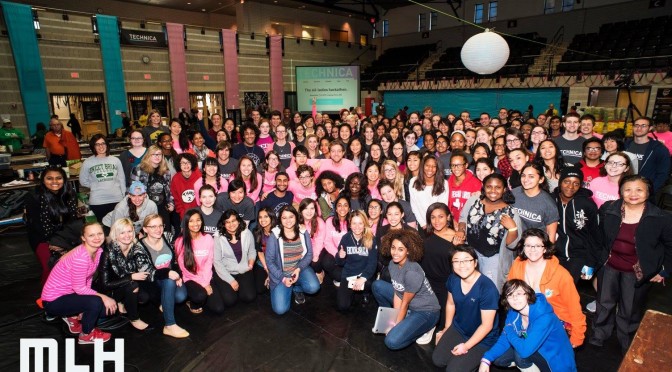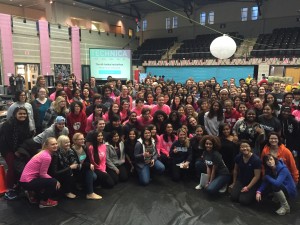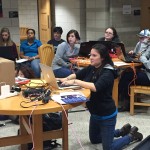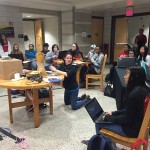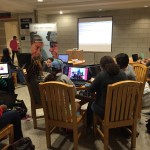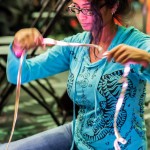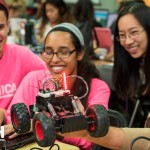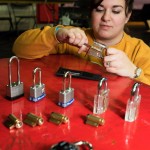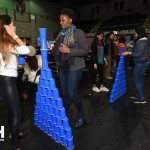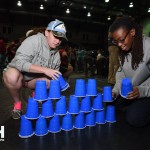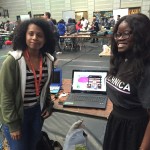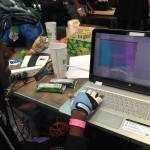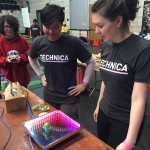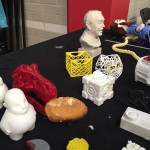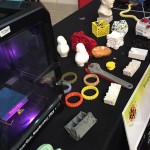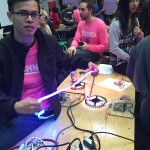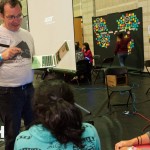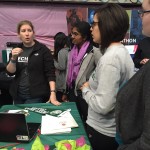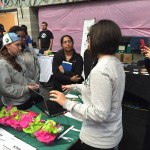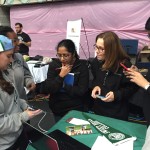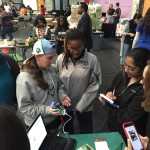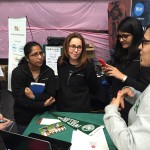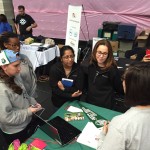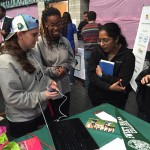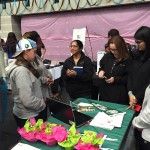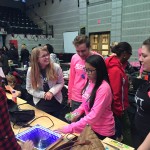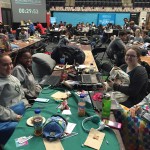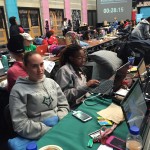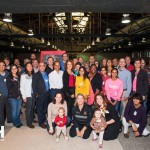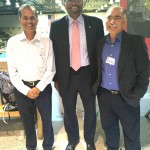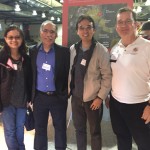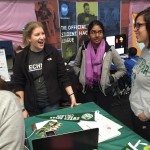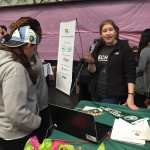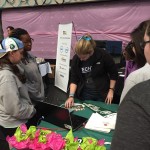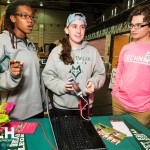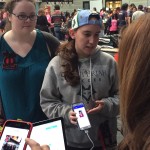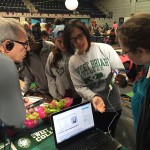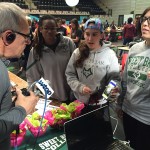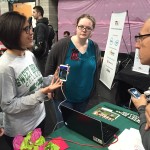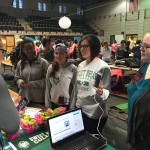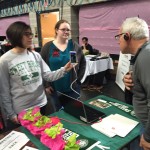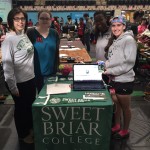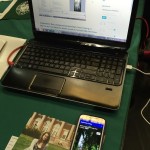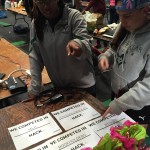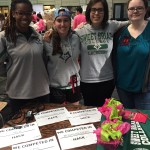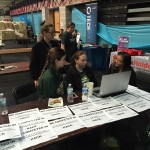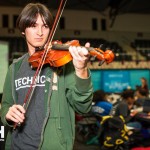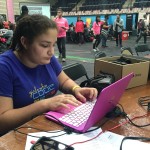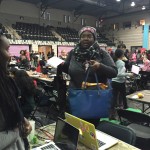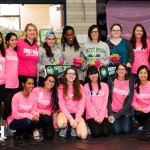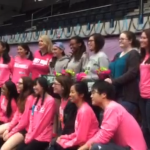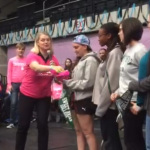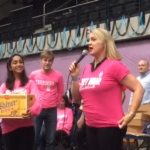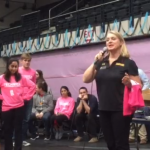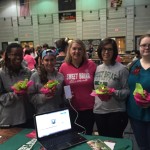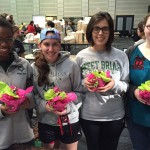What is a Hackathon?
First, let’s dispel a common misconception: A hackathon is not about cyber crime, hacking into companies or personal information or anything illegal. Let’s break it down:
“Hackathon” doesn’t (yet) exist in Webster’s Dictionary, but the best way to understand it is how it breaks down. “Hack” refers to the old fashioned use of the term to create, break something down, a project. “Thon” refers to an extended collective effort just like a “dance-a-thons”.
Technica, University of Maryland’s first All-Women’s Hackathon
This past weekend, Technica, the University of Maryland’s first all-women’s Hackathon launched at Ritchie Coliseum with over 400 participants. University of Maryland’s Terrapin Hackers have been national leaders since their inaugural “Bitcamp” hackathon in 2013.
I had the pleasure of witnessing Sweet Briar College’s first visit to a hackathon. I was particularly delighted to welcome this group as they come from my alma mater which is undergoing a resurgence after nearly facing closure by the prior administration in March of 2015. Sweet Briar has one of only two accredited Engineering programs at a woman’s college, the Margaret Jones Wylie `45 Engineering Program.
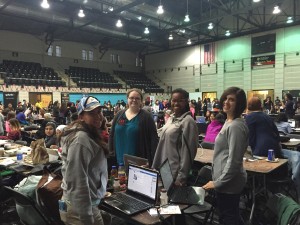
“This year over 50,000 students will participate in over 150 official Major League Hacking sanctioned hackathons around the globe. The student hacker community has been doubling in size every semester since 2013 and it is clearly here to stay. Hackathons are growing at warp speed,” — Major League Hacking.
Many describe hackathons as tomorrow’s classroom, career fair and even the rebirth of America’s economy. In this article in the Chronicle of Education (which also features my son, then a high school student), Brian Matthews describes his first experience at a Hackathon being the “frontier of education”.
Hackathons are a movement taking hold across the country bringing together people and ideas. They can take many forms from technological to social justice to artistic.
“Hackathons have grown to become a global student movement. By fast-tracking the software and hardware development process, hackathons provide students with valuable technical skills they will need in their future careers. Students learn by doing and finish with a final project that has the potential to turn into a real business. Collaborating in a high-stakes environment, students learn how to work effectively on a team. Students meet like-minded peers from around the world and also have a chance to interact with professional engineers and recruiters. Their new motivation and creativity remains after the hackathon, as hacker culture grows and a more diverse array of students travel to other collegiate hackathons to make new friends and win prizes.”
Students arrive at hackathons by car, bus, plane and other forms of transportation (including their parents driving them if they are in middle or high school). Some hackathons even reimburse for transportation, but all are free to participants.
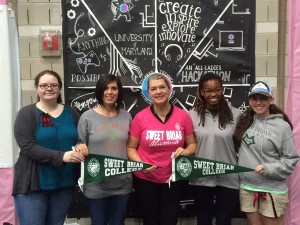
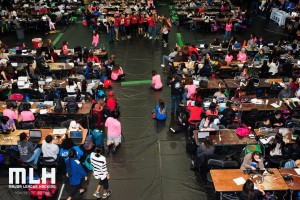
Students select their “home” for the weekend, a spot at one of many folding chairs and tables. After some introductory remarks including shared values for a positive group experience, participants have many choices. Workshops kick off right way offering many opportunities to learn new skills from coding to design to fun activities. When I left the Sweet Briar College team, they were in a class to learn python. Many of the strongest candidates for jobs in higher education today are learning skills outside of the classroom. Hackathons are a great way to add skills to one’s resume.
Hackathons don’t just offer coding, there are many things to learn. Some teams come in with ideas. Others arrive as individuals and form teams over shared interests. Some come out of the weekend with projects including the germination of a business while others are happy to learn new skills and return home.
Hackathons are great for Colleges and Universities because they do not require new resources. Skills taught at hackathons add to student’s skill sets and make them more employable. Technology changes so quickly, it is very difficult for academic institutions to prepare curriculum to keep pace. With hackathons, students have access to the latest technology that some institutions may not be able to provide.
Companies interested in students also become more connected to the Colleges and Universities sending students and hosting hackathons. These corporate-college relationships often expand into support for other programs, professorships, scholarships and even capital projects.
What is delightful is to see the joy and fun participants have through organized games and shared experiences.
Sponsorship
Sponsors make hackathons accessible to anyone. Cost is not an obstacle as most are free (some even reimburse for transporation costs). Sponsors linger through the weekend providing mentorship and getting to know participants personally. Sponsors also offer feedback on projects during demonstrations on Sundays.
In my work I have the opportunity work with University Relations recruiters from some of the nation’s top companies. More and more I am seeing them select hackathons as their “student engagement” of choice.
Sponsors of hackathons are able to have informal and formal interactions with participants. Most hackathons offer a resume database at the end to match interested students with potential companies. What makes hackathons “tomorrow’s career fair” is that companies can mentor students over the weekend and watch both student’s intellect at work as well as their personal skills. One recruiter told me, “You get to see their brains at work.”
Showcase vs. Competition
At the end of a hackathon, students have an opportunity to showcase their work over the weekend. Not everyone participates. The environment is one of showcasing over a competition. Prizes are awarded for categories. Sponsors have the latitude to create categories or to provide special recognition. Major League Hacking even has a category called, “I see where you are going with that…” and “Punny-ist Web Name”.
When I arrived on Sunday, the vixens were going strong. Wrapped in blankets, they had smiles on their faces and declared, “WE DID IT! IT WORKS!” I was impressed! Many teams don’t finish the weekend and a large majority do not actually come out with a finished project. What is even more amazing — and speaks to the quality of the education provided over a weekend — the girls pursued learning a new computer coding language and never dreamed they would have a finished project by the end. As an alumna knowing the importance of enrollment, it was incredibly gratifying to see their project: An app for prospective students.
An Alternative Homecoming
At the University of Maryland, my colleagues in University Relations are embracing hackathons as an alternative to homecoming. We find our alumni (I work in the sciences) relish the opportunity to attend an event exploring technology, the arts, and bringing together students, faculty and corporate leaders. Hackathons are also a family-friendly opportunity for alumni to bring their children and introduce them to the world of technology.
Finish Line – “Demos” (Demonstrations)
Every race has a finish line and every hackathon has a closing ceremony. The feeling is more of a campfire than a formal ceremony. Participants sit in a large circle and sponsors share feedback on the projects they particularly liked. Industry leaders offer their personal stories and encouragement.
The Sweet Briar College team tidied up their table of water bottles, leftover snacks, notes and laptops and cleared the way for their demonstration. They created an account on DevPost, a site dedicated to showcase digital portfolios. A DevPost entry is also the portal to officially representing your college or university at a hackathon and earning points. Sponsors streamed by their table and the students worked out their pitch. One described what they had learned, another pointed out the features of their app, another talked about the benefits of a hackathon, another pointed out the benefits of their college. By happy coincidence, the kit I had used at a recent college fair was in my car and the students put the materials to good use decorating their table. They were even interviewed by WTOP — Washington’s largest radio station.
The creativity around the room was inspiring! Participants came up with creations with laser printers. One team even came up with a way for children to make 3D printable furniture for their stuffed animals, dolls or barbies.
As I have raised money for Technica and the students know me, they were kind to allow me to take a moment in the program to tell the Sweet Briar College story and to acknowledge the students. I donned a pink “alumna” shirt over my University of Maryland polo for the occasion. The Sweet Briar College vixens earned loud applause and left with trophies wrapped in pink and green (the school colors).
Technica wrapped up with students hugging one another, paying final visits to sponsors and then streaming out to the awaiting buses and their cars. The Sweet Briar College team had a four-hour drive home, but they said their excitement would keep them awake. WTOP aired their story on Technica with Sweet Briar students as the lead story:
For more insight on hackathons, please visit my son Kent Heckel’s vlog where he provides a video journey through a hackathon (note – this hackathon was from Friday to Sunday):
https://www.youtube.com/playlist?list=PLbEp_xKTKUN_cangRc145rd-wi58Gtyzg
Over the past three years, I have seen students create amazing projects at hackathons. Spending a weekend creating is a wholesome way to have fun while boosting skills.
The students of Sweet Briar told me they are looking forward to Pearl Hacks at the University of North Carolina.
There is a hackathon (sometimes two) nearly every weekend of the year. Check out one near you!
Photo credit: Major League Hacking,
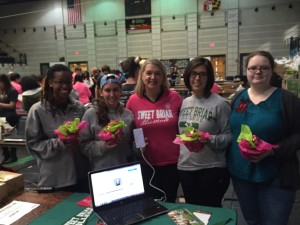
Stacey Sickels Locke, CFRE, is a proud graduate of Sweet Briar College, Class of 1988. She served as an employee of the College in the early 1990s working on the $25 million Campaign. During that time, she solicited many leadership gifts which make up the current endowment. Since then, she has spent her career building support for higher education and the nonprofit community as a staff member and consultant for boards. Stacey is a Senior Director of in the College of Computer, Mathematical and Natural Sciences. She is working with the Department of Computer Science on a campaign for a new building, the Brendan Iribe Center for Computer Science and Innovation made possible by the largest gift in the history of the University of Maryland, $31 million. She is a member of the Association of Fundraising Professionals (AFP), is affiliated (through the University of Maryland) with the Council for Advancement and Support of Education (CASE) and holds a Certified Fund Raising Executive (CFRE) certification from CFRE International.
Follow us....Share this....

